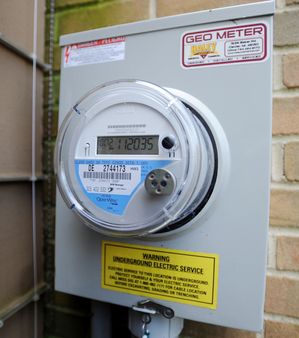A group headed by two Ann Arbor women is appealing an order by the Michigan Public Service Commission approving DTE Energy’s use of radio-disabled advanced meters for customers who chose to “opt-out” of the smart meter service.

DTE is in the process of installing the new advanced meters on homes and businesses in their coverage area which includes most of Eastern Michigan.
File photo | AnnArbor.com
“The commission and the judge completely ignored our extremely detailed argument on the cost of installing the radio-disabled meters,” organizer Linda Kurtz said.
“ And all of the health testimony we had was barred. One of the big things is that these so-called 'opt-out' meters do not solve the health problems for people who experience them.”
The new meters are designed to collect more accurate measures of power usage by DTE customers and are equipped with a radio device that allows for remote meter readings.
“It fully transforms our customer and service reliability options,” DTE spokesperson Scott Simons said.
“For one thing, they allow us to get true meter readings, which eliminate estimated bills. The meters also allow us to quickly locate and reduce the length of a power outage as well as more quickly connect and disconnect service.”
Simons said the ability to remotely connect and disconnect service can be extremely important for the company in assisting firefighters and other first-responders. “When there’s a house fire, the first responders will get there much more quickly than we can,” he said.
“With the new meters, they can give us a call, tell us where the address is, and then we can disconnect service to remove any potential hazard for them.”
After a meeting Tuesday, Simons said DTE will be adopting a number of changes to make customers more aware of their ability to opt out and receive the radio-disabled devices.
“We’re going to put the program information in a more prominent place on our website,” he said.
“Additionally, all of the letters that we send to people letting them know that we’re going to be installing the advanced meters in their neighborhood will provide opt out information. It’s been just a little over one month since the commission order so it’s something that’s a continuous improvement process.”
Kurtz believes DTE customers should be allowed to keep their older digital or analogue meters rather than having to switch to the new smart meters. The MPSC decision allows the company to charge customers who choose to have the radio-disabled meters an extra installation fee and monthly meter-reading fees.
MPSC spokesperson Judy Palnau said the public service commission’s attorneys would respond to the appeal and defend the commission’s order.
“This might not be over quickly though,” she said. “I’ve been told that the appeals process can be lengthy.”
Kurtz is unsure what decision the court will come to, but she hopes the health concerns she and others have expressed will be taken into greater consideration. Members of the network claim a variety of maladies — most notably insomnia and ringing in the ears — result from the installation of smart meters with or without the radio signal.
“Some people say that it’s all in our heads,” she said.
“But I have no reason to want to feel this way. I have no reason to want these effects on my body because it has limited my life to an extreme degree.”
There has not been conclusive evidence to scientifically prove the claim that smart meters have an effect on human health.
Ben Freed covers business for AnnArbor.com. You can sign up here to receive Business Review updates every week. Get in touch with Ben at 734-623-2528 or email him at benfreed@annarbor.com. Follow him on twitter @BFreedinA2